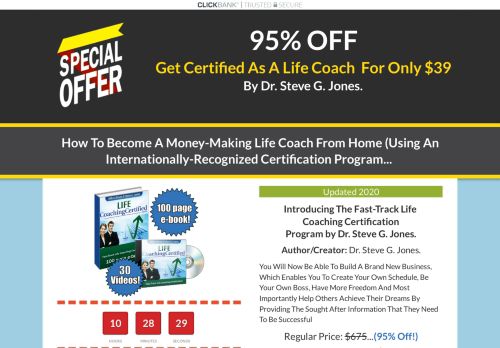
Unlock Your Potential: The Benefits of Life Coaching Certification
Introduction:
In today’s fast-paced world, personal development and self-improvement have become crucial aspects of leading a fulfilling life. As individuals strive to reach their full potential, the demand for skilled life coaches has surged. With a growing interest in life coaching, many are considering pursuing a certification in this field to enhance their skills and credibility. In this comprehensive guide, we’ll delve into the world of life coaching certification, exploring its benefits and why it’s a worthwhile investment for aspiring coaches.
Why Pursue Life Coaching Certification?
1. Professional Credibility:
Obtaining a life coaching certification adds a layer of professionalism and credibility to your practice. Clients are more likely to trust and seek guidance from certified coaches who have undergone formal training. Certification demonstrates your commitment to mastering the principles and techniques of life coaching, instilling confidence in your clients and setting you apart in a competitive market.
2. Enhanced Skill Set:
A structured certification program equips you with a diverse range of skills and tools essential for effective coaching. From active listening and powerful questioning to goal setting and accountability strategies, you’ll learn proven methodologies that empower individuals to overcome obstacles and achieve their goals. Through hands-on training and mentorship, you’ll refine your coaching techniques and develop a personalized approach that resonates with your clients’ needs.
3. Expanded Career Opportunities:
Earning a life coaching certification opens doors to a multitude of career opportunities in various industries and settings. Whether you aspire to work independently as a private coach, collaborate with organizations, or specialize in niche areas such as career coaching or wellness coaching, certification enhances your marketability and opens up avenues for professional growth. With the flexibility to tailor your coaching practice to align with your passions and expertise, you’ll unlock endless possibilities for making a meaningful impact in the lives of others.
How to Choose the Right Certification Program?
1. Accreditation and Reputation:
When selecting a certification program, prioritize those accredited by reputable coaching organizations such as the International Coach Federation (ICF) or the International Association of Coaching (IAC). Accredited programs adhere to industry standards and best practices, ensuring high-quality education and ethical standards. Research the reputation and track record of the certification provider, including reviews, testimonials, and success stories from past participants.
2. Curriculum and Learning Format:
Evaluate the curriculum and learning format offered by the certification program to ensure it aligns with your learning style and objectives. Look for comprehensive coursework that covers core coaching competencies, practical skills development, and supervised coaching practice. Consider factors such as course duration, flexibility, and availability of resources, such as online modules, live workshops, and mentorship opportunities, to enhance your learning experience and maximize your investment.
3. Faculty and Support Resources:
Assess the qualifications and expertise of the program faculty, including their coaching experience, credentials, and teaching approach. A reputable certification program will provide access to experienced coaches and mentors who offer guidance, feedback, and support throughout your journey. Additionally, inquire about post-certification resources and community networks that facilitate ongoing learning, professional development, and networking opportunities with fellow coaches.
Further Study Suggestions:
- Advanced Coaching Techniques and Specializations
- Emotional Intelligence and Resilience Building
- Business Development and Marketing Strategies for Coaches
- Integrative Approaches to Holistic Coaching Practices
- Neuroscience and Positive Psychology in Coaching
Related Topics:
- Personal Development and Growth
- Leadership and Performance Coaching
- Mindfulness and Well-being Practices
- Communication and Relationship Building Skills
- Career Transition and Life Transitions Coaching